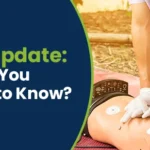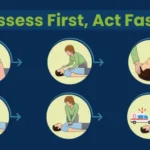Advanced cardiovascular life support (ACLS) plays a vital role in the fast-paced field of healthcare. ACLS-trained experts are often required to make crucial decisions that can be the differentiating factor during a crisis. The skills and knowledge required for patient care in ACLS are undeniable. However, what goes unnoticed is the psychological aspects of critical care, which we will discuss below.
Master ACLS Now
Get ACLS certified with confidence
What does the ACLS course cover?
Emergencies can happen at any time, and seeking an ACLS course will teach you to handle situations effectively. Keep reading to explore everything covered by ACLS:
- ACLS trains to handle emergencies: ACLS is a lifesaving skill, and the course teaches the ways to recognize, assess, and manage medical conditions that are responsible for the drop in the heart rate and breathing of a person. ACLS training will help you to attend medical emergencies such as asthma attacks and septic shock.
- Teaches CPR administration: The course covers everything about cardiopulmonary resuscitation and teaches ways to administer it. It also enlightens on the methods to use an automated external defibrillator (AED), steps to perform airway management, and ways to help manage cardiac arrest. Additionally, it also teaches about medical conditions that might interfere with blood supply regulation in the brain or heart.
- Manage life-threatening medical conditions: ACLS provides an overview of the different medical conditions that are life-threatening, such as heart attack, stroke, and cardiac arrest, and helps manage them.
Read More: https://aclsnow.com/blog/importance-of-learning-acls/
What are the psychological aspects of patient care in ACLS?
The psychological aspect of patient care often goes unnoticed. It is a reality that most people are not aware of. Let us explore the psychological aspects of patient care in ACLS:
- Prompt decision under pressure: When practitioners encounter a patient in cardiac arrest, it is essential to evaluate the condition and administer CPR immediately. It involves the ability to make decisions under stress. This increases pressure on the healthcare provider.
- Provide compassion and empathy: It is not only crucial to take care of the patients clinically but also, to be emotionally available for them. ACLS practitioners need to communicate with patients compassionately. Additionally, they also need to empathize with them to help them cope with stressful situations.
- Feeling of grief: In several scenarios, a patient might not survive even after getting the best care. This might give rise to feelings of grief and the need for self-care. It is crucial to build a support system to combat psychological distress.
How does the ACLS course help manage psychological distress?
An ACLS course helps in managing the psychological distress faced while providing care to patients. Here is how the course prepares you to respond appropriately and reduce stress:
- In-depth training: ACLS courses train individuals to manage various cardiac emergencies. It involves hands-on practice for practitioners to be well-versed in the procedures. Simulated scenarios help prepare individuals for medical emergencies and reduce fear.
- Increased communication: ACLS courses teach practitioners to collaborate and communicate better with colleagues. This reduces anxiety and instills confidence. By reducing feelings of isolation, ACLS promotes team communication. This helps them rely on one another and be supportive of each other.
- Follow protocols: ACLS follows a protocol guide for managing different emergencies. These guidelines help healthcare providers follow a well-formulated approach. This enables them to stay focused and administer patient care confidently.
- Courses involve practice sessions: Regular practice helps practitioners adjust well to the circumstances. As a result, they get more accustomed to the situations. This boosts their muscle memory and enables them to keep calm and offer care.
- Teach stress management techniques: Healthcare providers need to train themselves to handle stressful situations. Medical emergencies can be stressful. This is why you need to enroll in an ACLS course to manage stress. The course teaches crucial strategies to combat stress and manage psychological distress.
Who needs ACLS training?
Any medical professional can apply for ACLS certification. This includes physicians, nurses, and paramedics. Any professional working in an emergency room or critical care unit can also take the certification course. This will help all medical professionals become certified and provide help during a medical emergency.
Conclusion
The scope of critical care in ACLS is invaluable. A healthcare professional faces several psychological distresses frequently, such as prompt decision-making, offering compassion and empathy to patients, and more. The ACLS course offers a comprehensive understanding of the essential medical protocols to follow. It additionally trains an individual to stay focused, calm, and confident while offering medical assistance. With the help of its profound strategies, ACLS enables individuals to manage stress and reduce psychological distress.







